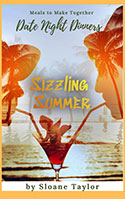Archive for 2006
Erin Go Bragh!
March 17, 2006 | Holidays
Happy St. Patrick’s Day to you all! And thank you Charmin’ Carmen for the correct spelling of the phrase.
For a good read click on this website, http://www.llerrah.com/irishproverbs.htm. Not only are the proverbs grand, the music will make you click your heels.
And to my personal Irish hero;
I love you Studly. Now when are you going to wear your kilt just for me!
Have a good one,
Sloane
OH CRAP!
March 14, 2006 | It's All About Writing
You’ve been hounding your postal carrier for weeks, begging for The Letter, the one that’s going to put you on the road to success. Nothing. Again. Today. But wait! What’s that stuck inside the newspaper advertisement you usually toss in the recycle bin without reading? Holy Royalties, Batman! It’s from the publisher. Correction. It’s from your publisher.
With shaking hands you tear open the envelope and draw out the letter. Hey wait! Where’s the contract? You spread the envelope apart, praying it’s stuck inside. Nada. Okay, okay, they’re probably going to send it after you accept their offer.
Grinning ear-to-ear you flip the letter over and read,
“Dear Author,
We are sorry to inform you…”
Yep, that’s pretty much how a rejection letter starts off. So what are you going to do about it? Sit there and cry? Gorge yourself on junk food until you’re ready to puke? Those reactions are typical. Very few writers entertain thoughts of suicide. And if you do, baby, you need some serious help.
This is the best advice I can give you on rejection; Get Over It. No one likes a whiner.
Sure no one likes to be rejected, be it from a lover, friend, or an editor. But there’s ways to retain your rationale without going over the edge.
Read your rejection again, after you come back surface from your blue period. If it’s a form rejection, without a real clue as to why your book was deep-sixed, then you’ll need to talk with someone in your writer’s or critique group for insight.
If you are fortunate enough to have an explanation of the rejection, study it. Learn from it. Editors are not evil. They don’t wake up every morning and plan which writers to destroy as they prepare for work. Editors want talented writers with a fresh voice. They are all looking for that one author who can help make the editor’s career. They want you to be the one.
Treat your rejection as a challenge. Frame it and hang it right over your desk. Look at it everyday and promise yourself you will do better. Then make it happen. Read your story again, edit it again, fix the problem areas and make it shine. When you are positive it’s the best you ever wrote, ship that baby right back out the front door. It’s just like falling off a bike; you have to get back on to overcome the fear.
Happy Writing!
Sloane
Publish this Novel
March 7, 2006 | It's All About Writing
You have put your heart and soul into a well-edited novel and the time has come to send that baby out into the world. What do you do? Again, it’s time consuming and can get costly so you have to decide what you can afford.
First, I recommend you buy Formatting & Submitting your Manuscript by Jack & Glenda Neff, Don Prues published by the Writer’s Market. This book has all the right instructions, with examples, for your submission.
Following are some extra tips;
• By now you should know the publisher you want to target. Read their guidelines, again. Be sure you
have the correct editor’s name and spelling. Call or email the publisher if you are unsure.
• Print your cover letter, synopsis, and manuscript on clean white paper. Don’t get cute. Editors don’t
like cute.
• If you are a smoker, DON’T while you are printing and packaging. The smell will be absorbed by your
paper and carry through to the editor bringing about a damned quick rejection.
• Be courteous in your letter, but by everything that is powerful, DO NOT suck up. You’re a
professional. Act like a professional.
Speaking of professional, here’s a few more things you should do;
• Join writer’s groups online.
• Join local writer’s groups.
• Develop or join a critique group.
• Get a web site. Be sure it has a professional look and not some honemade cutsy thing.
• Attend every conference you can afford and network. There are rules of etiquette you must follow;
Smile, be pleasant. No one wants to hear about your kid, the brat, or your other half, the jerk.
Don’t interrupt someone who is speaking.
Don’t gossip.
Dress professionally, which means look presentable not like you’re on an emergency toilet paper run.
• Produce a business card with the following info;
You name
A slogan to remember you
Your email address
Your phone number but only on cards for editors and friends
Fax number if you have one but only on cards for editors and friends
The card would look something like this;
Author
Mary Johnson writing as Hot Mama
Hot Mama sets your world on fire
hotmama@sbcwhatever.net
www.hotmama.com
Dress your card in the same look as your web site.
Good luck to you all and please let me know how it goes. If you have any questions or comments, feel free to post them.
Until next Tuesday, Happy Writing!
Sloane
Run, Do Not Walk
March 4, 2006 | Hot Damn
to New Concepts Publishing for the hot carnal release of Atonement by Sherrill Quinn. This amazing book was released just today.
So type in www.newconceptspublishing.com
Click on New Releases
Scroll down to Hot New Carnal
And BUY THE BOOK!
Suspense and hot sex. Congratulations, Ms. Quinn on another excellent book.
Put Down the Feathers
March 3, 2006 | It's All About Writing
we’re not talking Conga Line. This is serious. We’re talking Line Editing a simple, but very tedious task you must do carefully before you submit to a publisher. You have about thirty seconds to catch the editor’s eye and entice them to read more of your book. If he or she sees typos, incorrect words (buy vs. by), or skewed sentence structures, it’s the rejection pile for your baby. And by all means, pay close attention to your punctuation.
This is how you do it;
• Print out a hard copy
• Grab a 12 inch ruler.
• Lay it under line one.
• Read each word slowly. Aloud is best.
• Focus. This is a must. Don’t think about anything but your novel.
• Make the corrections using a colored pen on the hard copy.
• Insert the corrections into your computer text.
• Take breaks or your mind won’t pick up the errors.
Some authors like to line edit from the back of the novel and work forward. It stops your mind from assuming the words are correct. I’ve tried it and it does work. All you do is read and edit the last page first, then proceed forward, one page at a time.
It’s a tough job, but you have to do it.
Next Tuesday we’ll discuss, “Publish This Novel”.
Until then…Happy writing!
Sloane
Cinch that Belt!
February 28, 2006 | It's All About Writing
Today let’s work on Syntax and Tighten the Writing. By doing the former you will achieve much of the later.
Syntax is the patterns of formations of sentences and phrases from words and the rules of the formation of grammatical sentences in a language.
Don’t you just love Webster definitions? They make everything so unclear.
In plain English Syntax means the word arrangement and sentence structure.
Remember that old song by Tom Jones, and later Joe Cocker, “You Can Leave Your Hat On”? It was sexy, vibrant, and made you want to, ahh… er… just leave your hat on.
The phrasing is great for lyrics and dialogue but oh so wrong for narrative. Why? You should never end a sentence with a preposition. Yes, it sounds right. Yes, we talk that way. Grammatically it is incorrect.
How should it read? “You can leave on your hat.” Sure doesn’t have the same impact does it?
Frequently grammatical sentences don’t have the same effect. If you find this to be true, save the prepositional endings for your dialogue. Sometimes you can’t help but use them in narrative because you need that force or dramatic effect. It’s okay but do it sparingly.
Here’s an example of what Redmond O’Hanlon, Into the Heart of Borneo, Vintage 1987, got away with in his novel;
“My companion, James Fenton, however, whose idea the venture was, enigmatic, balding, an ex-correspondent of the war in Vietnam and Cambodia, a jungle in himself, was a wise old man in these matters.”
I don’t know if Fenton did this as a joke on his editor, if it got missed in the edits, or he wanted this sentence to read as written. But I will guarantee you won’t get away with this type of writing with today’s editors. Be sure to read your work aloud and correct any sentences that are convoluted.
ALOUD is the key word here. Read your work aloud. I can’t stress this enough. It’s the only way to allow your ear to pick up the errors. Sure you’ll feel stupid doing it, even if you are home alone locked in your closet. Get over it. We all experience the same reaction. Here’s your option; let your book go to an editor with written garble and expect a nice form rejection in the return mail.
When you read aloud look for;
• Does your intent come across – action, suspense, romance, sorrow?
• Does something detract from your meaning?
• Fine-tune your sentences until they sound perfect, rhythmic, to your ear.
To further Tighten the Writing get rid of unnecessary words. It will make your writing sound stronger. Those expendable words are, but not limited to;
• A little
• Almost
• Anyway
• At the present time
• Began to
• By means of
• Certainly
• Considering the fact that
• Definitely
• Even
• Is/was/were
• Just
• So
• Some
• That
• Very
Be concise, don’t ramble on with your descriptions. Think about the sections you skim or avoid when you read a novel. Don’t allow that to happen to your reader. Make sure you haven’t flooded a section with so much back story or description you are boring the reader. Get rid of the excess because most of it won’t matter.
Please don’t write you book via Roget’s Thesaurus. Today’s editors want meat in a book, not fat. Your reader doesn’t want to be written down too. Use the everyday words of your speech and not some $20.00 word that has your reader reaching for their Webster’s.
Avoid clichés like the plague. Get the idea? You are a writer – so write something new.
I’m not being bitchy here. I want you to get published. We should have millions of new books available from the reliable E-publishers and on the shelves of every type bookstore. But if you don’t do your job the numbers will be low and our future generations won’t have the role models they need.
Break out your manuscript, once again, and read it aloud. We’re almost done. Friday we’ll Line Edit.
Until then, Happy Writing…
Sloane
Yak, Yak, Yak
February 24, 2006 | It's All About Writing
“Hi, Liz. How are you today?”
“Well hi, David. I’m fine. How are you?”
“I’m just fine. It’s really good to see you.”
“Likewise. What’s new?”
HELLO! Time to wake up. I know you’re bored beyond relief with that less than scintillating dialogue, but the example was necessary. Why? To show you what kind of dialogue will irk your readers to book burning. As an aside, the only good thing about that above example is the punctuation is correct.
Yes, people really do talk mundane. It’s called idle chitchat and we use it all the time. As a writer you’d better not shovel that kind of crappy dialogue down your reader’s throat or the only sound you’ll hear is the toilet flushing away any future sales.
Your dialogue must;
• Push your story along
• Give insight to your characters
• Be active
You owe your reader a good story. They expect it. They deserve it. You had better deliver.
How do you write exciting dialogue? Good question and there’s no definitive answer. Following are some clues to help you.
Look at your manuscript. Read the dialogue out loud. Check for the following;
• Does each character speak in a specific voice? Or do they all sound alike?
• Are you conversations pertinent to what’s happening at the time? To the progress of the story?
• Does your dialogue carry emotion?
• Does your dialogue make the reader want to skim and go onto the next section or read every word?
Read your written dialogue out loud. Listen to the sound and rhythm of the sentences. Correct or delete as the case may require. Next, and this is the important part, have someone else read the same passages aloud without knowing what’s happening before and after. Hearing your words from another person will help you pull it together and notice the weak spots.
If you’re writing erotica, please remember couples think and talk during sex. Even if one of your characters is shy, can’t say what they’re feeling, they are thinking. Turn their thoughts into short sentences. It will add more depth to your character and meaning to your story.
Tuesday we’ll work on Tighten the Writing and Syntax. Until then, Happy Writing,
Sloane
Kick It Up a Notch
February 21, 2006 | It's All About Writing
Show Don’t Tell is a confusing phrase that has many new writers yanking out their hair. What does it mean? How do I do it? Leave those Clairol locks in place because the explanation is simple.
Showing is action. It is what your character is doing at that moment. Telling is a passive writing, a way of explaining what your character is doing. It can also be considered author intrusion, a big no-no to editors.
Here are a few examples;
Telling – Liz had on a red suit with a white rose in the lapel and a white linen blouse.
Showing – Liz plucked a white rose from the bouquet on the coffee table. Carefully she slipped the short stem into her lapel then glanced in the mirror and smiled at how perfect its creamy color looked against the red jacket. She tugged on her blouse cuff, gently so as not to wrinkle the linen.
T – There was shouting from the balcony.
S – Shouts echoed from the balcony.
T – The dog show was judged by Frank.
S – Frank judged the dog show.
T – Mary was sad.
S – May sobbed.
In many cases showing requires more words to paint the right picture and that’s a good thing if the scene requires them.
To easily locate the places where you Tell, hold down the Control key while you press the letter F key. It will bring up a Find and Replace panel. Type in the word ‘was’ without the apostrophes and press ‘Find Next’. Read each sentence and/or section that appears. Should it or could it be more active? You may be surprised at how your novel will improve by this simple exercise.
Thursday we’ll discuss dialogue and just how important it is to your story.
Until then, Happy Writing,
Sloane
Hotclue is on a Roll!
February 20, 2006 | It's All About Writing
Good morning, everyone. Tomorrow’s the big day for Show, Don’t Tell but today the hottest blog for info is over at www.bethanderson-hotclue.com/blog.
Beth is being inteviewed by Hotclue and has tons of info for all of us writers. So jump on over and be sure to visit the websites Hotclue recommends.
See you Tuesday,
Sloane
She Did It Again!!
February 16, 2006 | Hot Damn
More good news to share with all of you. Sherrill Quinn has received another, yes – another contract for a new story. Torrid Press is printing her new story this coming winter. CONGRATULATIONS, Sherrill!
Now you all have to head over to www.sherrillquinn.com for all her great news and a hot blog.
I’ll be back Tuesday and we’ll continue with editing. Our topic will be Show, Don’t Tell.
Sloane




